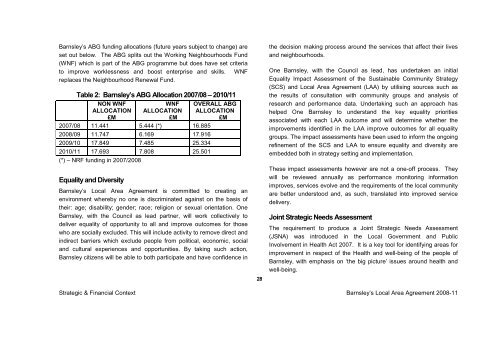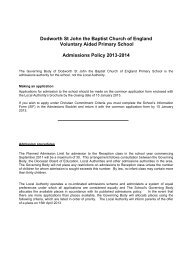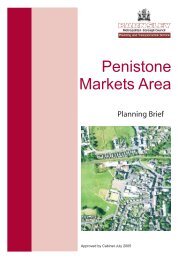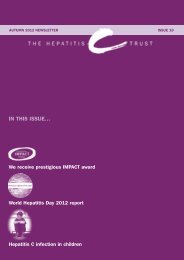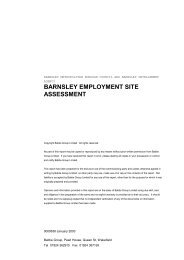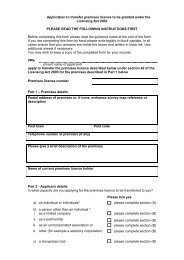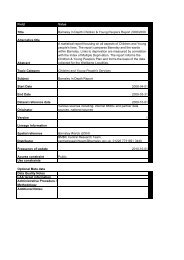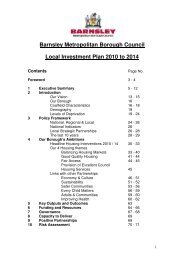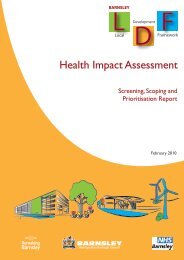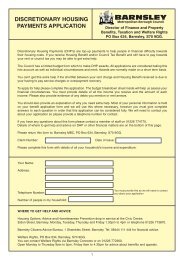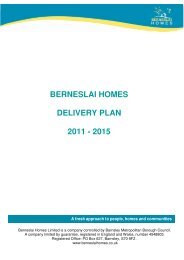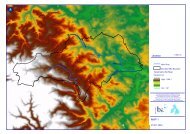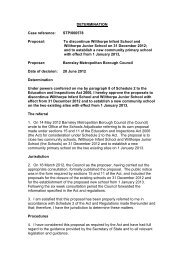BMBC 21: Barnsleys Local Area Agreement 2008-2011
BMBC 21: Barnsleys Local Area Agreement 2008-2011
BMBC 21: Barnsleys Local Area Agreement 2008-2011
- No tags were found...
Create successful ePaper yourself
Turn your PDF publications into a flip-book with our unique Google optimized e-Paper software.
Barnsley’s ABG funding allocations (future years subject to change) areset out below. The ABG splits out the Working Neighbourhoods Fund(WNF) which is part of the ABG programme but does have set criteriato improve worklessness and boost enterprise and skills. WNFreplaces the Neighbourhood Renewal Fund.Table 2: Barnsley’s ABG Allocation 2007/08 – 2010/11NON WNFALLOCATION£MWNFALLOCATION£M2007/08 11.441 5.444 (*) 16.885<strong>2008</strong>/09 11.747 6.169 17.9162009/10 17.849 7.485 25.3342010/11 17.693 7.808 25.501(*) – NRF funding in 2007/<strong>2008</strong>Equality and DiversityOVERALL ABGALLOCATION£MBarnsley’s <strong>Local</strong> <strong>Area</strong> <strong>Agreement</strong> is committed to creating anenvironment whereby no one is discriminated against on the basis oftheir: age; disability; gender; race; religion or sexual orientation. OneBarnsley, with the Council as lead partner, will work collectively todeliver equality of opportunity to all and improve outcomes for thosewho are socially excluded. This will include activity to remove direct andindirect barriers which exclude people from political, economic, socialand cultural experiences and opportunities. By taking such action,Barnsley citizens will be able to both participate and have confidence inthe decision making process around the services that affect their livesand neighbourhoods.One Barnsley, with the Council as lead, has undertaken an initialEquality Impact Assessment of the Sustainable Community Strategy(SCS) and <strong>Local</strong> <strong>Area</strong> <strong>Agreement</strong> (LAA) by utilising sources such asthe results of consultation with community groups and analysis ofresearch and performance data. Undertaking such an approach hashelped One Barnsley to understand the key equality prioritiesassociated with each LAA outcome and will determine whether theimprovements identified in the LAA improve outcomes for all equalitygroups. The impact assessments have been used to inform the ongoingrefinement of the SCS and LAA to ensure equality and diversity areembedded both in strategy setting and implementation.These impact assessments however are not a one-off process. Theywill be reviewed annually as performance monitoring informationimproves, services evolve and the requirements of the local communityare better understood and, as such, translated into improved servicedelivery.Joint Strategic Needs AssessmentThe requirement to produce a Joint Strategic Needs Assessment(JSNA) was introduced in the <strong>Local</strong> Government and PublicInvolvement in Health Act 2007. It is a key tool for identifying areas forimprovement in respect of the Health and well-being of the people ofBarnsley, with emphasis on ‘the big picture’ issues around health andwell-being.28Strategic & Financial Context Barnsley’s <strong>Local</strong> <strong>Area</strong> <strong>Agreement</strong> <strong>2008</strong>-11


